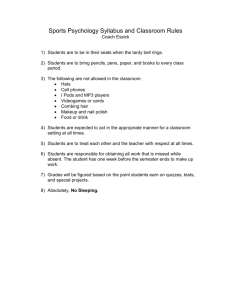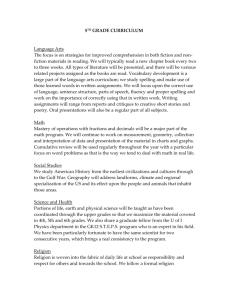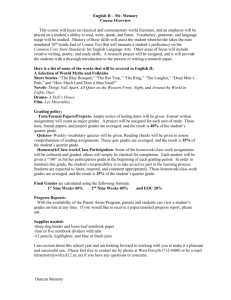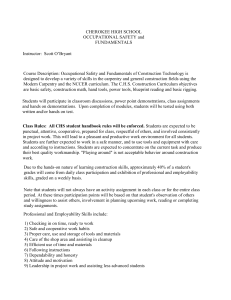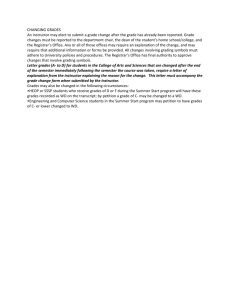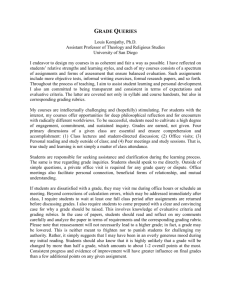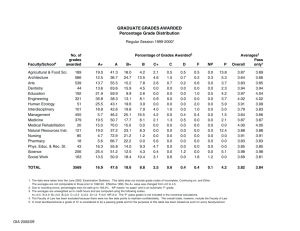Syllabus
advertisement
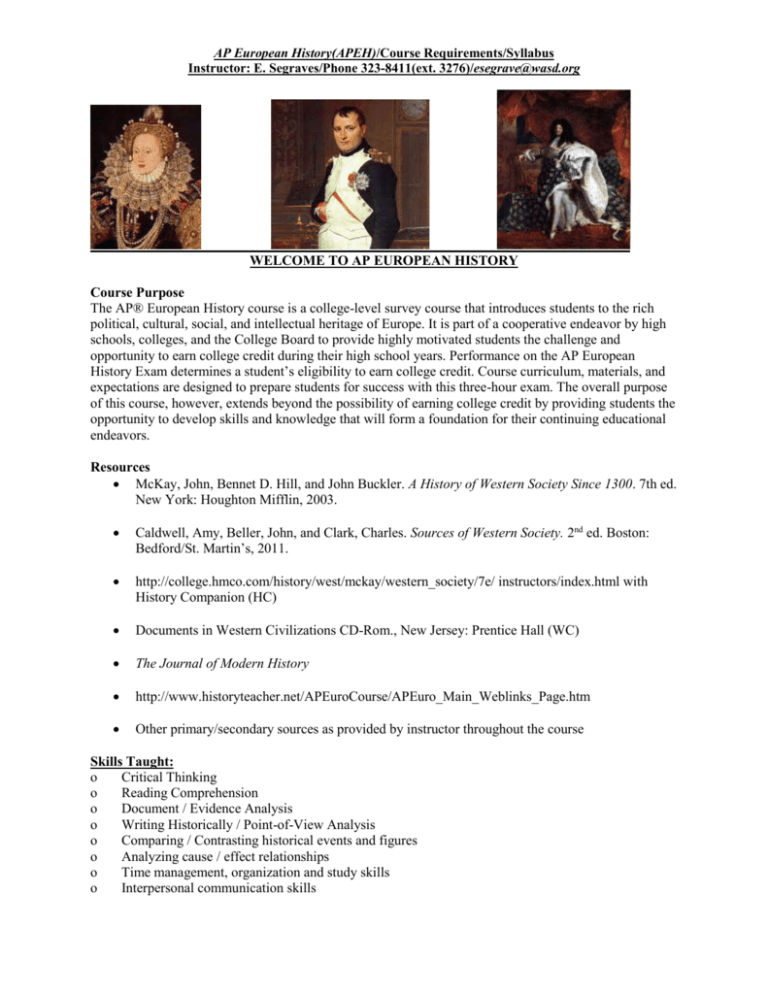
AP European History(APEH)/Course Requirements/Syllabus Instructor: E. Segraves/Phone 323-8411(ext. 3276)/esegrave@wasd.org WELCOME TO AP EUROPEAN HISTORY Course Purpose The AP® European History course is a college-level survey course that introduces students to the rich political, cultural, social, and intellectual heritage of Europe. It is part of a cooperative endeavor by high schools, colleges, and the College Board to provide highly motivated students the challenge and opportunity to earn college credit during their high school years. Performance on the AP European History Exam determines a student’s eligibility to earn college credit. Course curriculum, materials, and expectations are designed to prepare students for success with this three-hour exam. The overall purpose of this course, however, extends beyond the possibility of earning college credit by providing students the opportunity to develop skills and knowledge that will form a foundation for their continuing educational endeavors. Resources McKay, John, Bennet D. Hill, and John Buckler. A History of Western Society Since 1300. 7th ed. New York: Houghton Mifflin, 2003. Caldwell, Amy, Beller, John, and Clark, Charles. Sources of Western Society. 2nd ed. Boston: Bedford/St. Martin’s, 2011. http://college.hmco.com/history/west/mckay/western_society/7e/ instructors/index.html with History Companion (HC) Documents in Western Civilizations CD-Rom., New Jersey: Prentice Hall (WC) The Journal of Modern History http://www.historyteacher.net/APEuroCourse/APEuro_Main_Weblinks_Page.htm Other primary/secondary sources as provided by instructor throughout the course Skills Taught: o Critical Thinking o Reading Comprehension o Document / Evidence Analysis o Writing Historically / Point-of-View Analysis o Comparing / Contrasting historical events and figures o Analyzing cause / effect relationships o Time management, organization and study skills o Interpersonal communication skills Course Description: The study of European history since 1450 introduces students to cultural, economic, political, and social developments that played a fundamental role in shaping the world in which they live. Without this knowledge, we would lack the context for understanding the development of contemporary institutions, the role of continuity and change in present-day society and politics, and the evolution of current forms of artistic expression and intellectual discourse. AP European History develops an understanding of the main themes in modern European history, including political and diplomatic, intellectual and cultural, and social and economic history. Analyzing historical evidence and reading critical literary narratives is integrated into the chronologically ordered whole picture of the modern history of Europe. Using a college-level textbook, this course begins with the Renaissance and concludes with the demise of communism in Eastern Europe, the reunification of Germany, and the crisis of global terrorism. In addition to providing a basic narrative of events and movements, the goals of AP European History are to develop (a) an understanding of some of the principal themes in modern European history, (b) an ability to analyze historical evidence and historical interpretation, and (c) an ability to express historical understanding in writing. Themes: 1. Intellectual and Cultural History Changes in religious thought and institutions Secularization of learning and culture Scientific and technological developments and their consequences Major trends in literature and the arts Intellectual and cultural developments and their relationship to social values and political events Developments in social, economic, and political thought, including ideologies characterized as “isms,” such as socialism, liberalism, nationalism Developments in literacy, education, and communication The diffusion of new intellectual concepts among different social groups Changes in elite and popular culture, such as the development of new attitudes toward religion, the family, work, and ritual Impact of global expansion on European culture 2. Political and Diplomatic History The rise and functioning of the modern state in its various forms Relations between Europe and other parts of the world: colonialism, imperialism, decolonization, and global interdependence The evolution of political elites and the development of political parties, ideologies, and other forms of mass politics The extension and limitation of rights and liberties (personal, civic, economic, and political); majority and minority political persecutions The growth and changing forms of nationalism Forms of political protest, reform, and revolution Relationship between domestic and foreign policies Efforts to restrain conflict: treaties, balance-of-power diplomacy, and international organizations War and civil conflict: origins, developments, technology, and their consequences 3. Social and Economic History The character of and changes in agricultural production and organization The role of urbanization in transforming cultural values and social relationships The shift in social structures from hierarchical orders to modern social classes: the changing distribution of wealth and poverty The influence of sanitation and health care practices on society; food supply, diet, famine, disease, and their impact The development of commercial practices, patterns of mass production and consumption, and their economic and social impact Changing definitions of and attitudes toward social groups, classes, races, and ethnicities within and outside Europe The origins, development, and consequences of industrialization Changes in the demographic structure and reproductive patterns of Europeans: causes and consequences Gender roles and their influence on work, social structure, family structure, and interest group formation The growth of competition and interdependence in national and world markets Private and state roles in economic activity Course Format This course will be taught as a seminar, which means that each student will play a vital role in the learning process. As in most of college level courses, there is a tremendous amount of discussion. In the traditional seminar, students are responsible for completing outside readings so that the interpretation of the literature can be discussed for deeper analysis and understanding in class. As part of class participation, each student is expected to guide a class session over an assigned problem and/or concept. Throughout the course, students will also work to analyze and interpret multiple primary and secondary sources. Students will be taught to evaluate the text, context, and subtext of a document. It is important to understand who wrote a source and when it was created. These sources will be utilized during lectures as well as integrated into written assignments. During this course, students should expect to use documents as a reference tool in their writings and discussion frequently. Multiple sources should always be used when responding to various prompts. DBQ assignments are one example of this type of work. Grading Grade Scale The following is the conversion scale from letter grades to numerical grades used in this course. A+ = 100% C = 80% A = 97% C- = 75% A- = 95% D+ = 74% B+ = 93% D = 72% B = 90% D- = 70% B- = 85% F = 60% and below C+ = 83% Assignments will often be based on points, then points converted to a letter. Most assignments will be out of 100 points. *NOTE: Interpret a D grade (70-74) as a warning sign that one is not establishing a strong enough academic foundation to assure passage of the class. If you are in need of extra help, please ask. Grade Breakdown Attendance/participation 15% Homework/groupwork Exams 15% 30% DBQ/FRQ/writing assignments *a minimum of one DBQ and one FRQ will be completed each marking period 40% What an AP Grade Means: The end product of the AP Exam is the AP grades are reported to students, schools, & their designated colleges in July. The colleges use these grades as the barometer of students’ abilities & achievements when they make their decisions regarding whether or not to grant credit and/or advanced placement. Check the AP College Board site https://apstudent.collegeboard.org/apcourse/apeuropean-history for additional information concerning the course and college acceptance. The AP grade scale ranges from 5 to 1 meaning: 5---Extremely well qualified 3---Qualified 4---Well qualified 2---Possibly qualified 1---Not recommended AP Exam grades of 5 are equivalent to A grades in the corresponding college course. AP Grades of 4 are equivalent to grades of A-, B+, and B in college. AP grades of 3 are equivalent to grades of B-, C+, and C in college. As an upper level, “collegiate” course, know that your class work, your independent work, your group work, your writing, your ability to analyze and synthesize, and your mastery of the subject matter will determine your grade in this course. In addition, the course will be geared toward the spring, AP exam. Therefore, we will perform and learn how to do many academic tasks to prepare for the next level of education! There are no guarantees as to the outcome of your performance on the AP Exam. I will work VERY HARD to put you in touch with the information necessary to prepare you for the exam. The rest is UP TO YOU & the EFFORT you put into YOUR preparation for the exam. You MUST put some effort, outside of class, to prepare as well. EXPECTATIONS: You are expected to complete all reading assignments in advance as preparation for class acitivities. Content can be difficult to understand without prior knowledge. Have your textbook, notebook, and all other class essentials everyday! Attend class with work complete and ready to hand in – on time. Late work is half credit, anything beyond one day will not be accepted. ALL students can, and should, make great contributions to the class. You will be expected to search for information rather than have it all “handed” to you. During these times the classroom instructor will act as a “coach” to motivate you in your quest for knowledge. You will WRITE OFTEN and WRITE WELL!! Your main focus will be writing and assessing DBQ’s (Document Based Questions) and FRQ’s (Free Response Questions). Learning the skills in writing these will serve you well as you move on in your education. Know your academic standing in this class at all times. The grading policy is explained within this syllabus. If you have any questions about your grade, don’t hesitate to ask. Please use the Student/Parent Portal to check your grades often. Arrive on time, or have an appropriate pass – sign out only during the last 10 minutes of class Use of electronic devices is prohibited unless approved by the instructor All work must be made up within two days of an absence, you are responsible for getting any work you missed while not in class. Do not copy or plagiarize – result is a zero!
